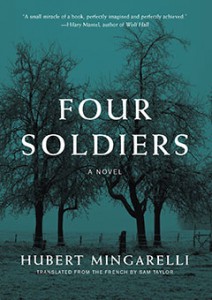Even as we celebrate 30 issues, join us at Asymptote as we bring you new reviews of exciting fresh releases. Dive into four titles here with us, featuring work set in Russia, the former Yugoslavia, Syria, and Argentina. Keep on following our blog in September to witness the journey our team has been through in the last seven years.

Checkpoint by David Albahari, translated from the Serbian by Ellen Elias-Bursać, Restless Books, 2018
Reviewed by P.T. Smith, Assistant Editor
On the jacket copy for Ellen Elias-Bursać’s translation of David Albahari’s Checkpoint, Restless Books cites Waiting for Godot and Catch-22 as comparisons. I’ll take them, especially the latter, but if I’m pitching this book to people, I’d offer up authors instead of books, and César Aira and Kurt Vonnegut. They better suggest the whimsy and quick-play changes that fill the brief pages of this novel, the sense that anything might happen, that the rules of the narrative can change in a sentence. Aira brings the freedom and the pace that Checkpoint has and Vonnegut the gentler, more passive characters than the strange and bold people who make up Catch-22.
Checkpoint is a quick book, coming in at under 200 pages in small format, and written entirely in one paragraph. It’s the latter that sets the pace. There are no pauses, sentences come and come and come, and so, though it seems as though at times nothing happens, events can rise and fall in an instant. This pace fits a war novel that’s about the absurdity of war, which Checkpoint determinedly and obviously sets out to be. A group of around 30 soldiers marches with their commander to guard a checkpoint, but they have no idea who they are guarding it against, who they are at war with, or even which side of the checkpoint they marched from. They have no known orders, and no way to communicate with their superiors. It’s a paralyzing life, one which soon includes mysterious deaths, refugees, attacks by soldiers of unknown allegiance, severe weather, and misfortunate forays into the surrounding forest.
Aira is famous for writing his novels with endless forward momentum, not returning to edit, so that the narrative can mutate in a second, a character or reality which existed in one way can in the next second become something else. Albahari follows a similar logic. Changes arise out of nowhere, characters suddenly possess knowledge they didn’t have before, the forest surrounding the checkpoint goes from mass wilderness to having a village, many paths, old buildings, whatever propels the narrative out of idleness, or lets for a moment of peace outside of war. When they hear a strange voice over the radio in an unknown language, someone suggests it’s Esperanto, which leads to our discovery that it was the “commander’s great love when he was a child,” and a considering of what it means for a soldier to love a language like that. This is a simple example, more often it’s strange, jarring, and feels like a break with reality.
There are indeed breaks, the book becoming more and more absurd and increasingly violent as it marches towards its conclusion. The narrative voice breaks down from a “we” meant to encompass the whole troop of soldiers, to telling the story only of the commander. The war, which might not even be real, continues on, taking its toll. Checkpoint is fun, and also uncomfortable. It’s not alone in writing about the absurdity of war, but many of its ideas and specifics, with languages, with boundaries and alliances shifting unpredictably, seemingly across families and neighborhoods, place it as commentary on the wars that broke up the former Yugoslavia, helping ensure Checkpoint offers something new to readers.

States of Passion by Nihad Sirees, translated from the Arabic by Max Weiss, Pushkin Press, 2018
Reviewed by Andreea Scridon, Assistant Editor
My immediate impression of Nihad Sirees’ States of Passion, originally published in 1998 and translated into English by Max Weiss in 2018, was of a book firmly anchored in the style of the era in which it was written, despite a quantity of flashbacks. The paced narrative takes on an almost journalistic character, while the upbeat, fast-talking, and emphatic color is something we recognize from Rushdie or Murakami. However, what struck me about Sirees was the utter straightforwardness of his prose: there is no particular stylistic craftsmanship. This is an author interested in clarity, in the representation of fundamentally ordinary people.
The novel is presented as a true story if we are to believe the narrator, who shares the author’s name. Our narrator finds himself knocking on a stranger’s door for shelter on a stormy night. Thus he comes to be privy to a story that the master of the house, an agreeable elderly man, imparts: a story that reveals the Sapphic world of Khoja singers of the charming Aleppo of the interwar period, but also one that “festers in his chest”, as well as in that of his hateful manservant. One comes to endear this narrator, despite his questionable behavior, as a character free of complexes and prejudices.
The plot is engaging and believable, full and rounded, though the mystery subplot is neither predictable nor unpredictable. I felt consistently eager to learn how it would turn out.
Weiss domesticates his translation into American English like a lion tamer: I did not think the day would come in which I would read the word “highfalutin” in the context of 1930s Syria, but I enjoyed and even admired it, because the colloquial and youthful voice of the narrator gives verve to a topic that, with a different presentation, could have potentially seemed too distant from our contemporary world.
Given the alternation between this almost naïve style and the topics that grow increasingly serious as the action intensifies, there is a certain unevenness of tone. What redeems this is the underlying capacity to transcend the somewhat banal context. We are presented with what is both a troublingly promiscuous and plaintive scenario, the cheap thrills which are tossed towards the reader perhaps gratuitously throughout the bulk of the novel pale in comparison to the final impression that one is left with.
The trope of aging is addressed with great naturalness: the pain of aging and the pleasure of remembering, of wanting to remain young, are experienced by several characters and felt in different ways. The contrast between the youthful narration and this recurring topic of degradation was somewhat strange, but not unpleasant. I am sorry not to be able to read the original in order to evaluate how true it is to the original tone.
A related trope is that of temporality. Considering more idyllic times, before war and fundamentalism, one thinks of the love songs that have now been replaced with wails as possessing an additional dimension.
States of Passion is then, at the same time, transparent and immersive. It is a simple and poignant work, and yet one from which I felt something was missing or unclarified, even fraught, but, I suppose, it is inevitable that a novel that mirrors life could forgo this very real aspect of the human condition.

Melodrome by Marcelo Cohen, translated from the Spanish by Chris Andrews, Giramondo, 2018
Khai Q. Nguyen, Editor-At-Large for Vietnam
Sensual yet philosophical, full of dark humour, Melodrome is a story about the journey to discover oneself with one’s desires and love, as well as the meaning of what it is to be human in the world of absurdities.
Lerena Dost is a successful woman working in a consultancy firm, deemed by many as manipulative. She has a romantic affair with her therapist, Suano, another successful professional, who possesses an unbelievably excellent mnemonic memory. Both lose everything for their love and desires, which are beautifully and hauntingly described at the beginning of the novel.
They woke up attached to one another like a petal clinging to the fingertip of the hand that has cut a rose. Suano was still hungry for her body, even after the night of sex, and full of desire for what money can buy. He wanted to buy, or at least to possess, the armchair, the velvet gown, everything he could see in that room, down to the massage mattress.
An unexpected acquaintance in a lift opens up many possibilities and much imagination in Lerena. After this encounter, she is determined to embark on a journey to prove that she wasn’t trying to manipulate anyone, to repay the debt, to give a gift and to say thank-you to Dona Munava, a once-famous singer, who, after recovering from a deadly disease, went on to found a religious sect far away in the countryside where “the inhabitants willingly keep each other under strict surveillance; and yet there’s a way to feel free inside, which is to relinquish freedom of choice and personal opinion.”
And so Lerena and her therapist-cum-lover Suano start their Odessan quest to meet Dona with the belief that the best remedy for the messiness of life is to dress up an obsession as a project.
The novel has no chapter breaks, no quotation marks (that reminds readers of Cormac McCarthy) and in the intervals of the characters’ action and absurd talks, silence prevails while time crawls by against the backdrops of icy dew, smoky sky, rocky landscape, and fire, ash, and arid soils are only things that loom large in their horizon. It is a boldly imaginative story of a hallucinatory journey to find the meaning of being in the absurd futuristic world, a journey into the battle against self-deception and to find one’s self on the verge of Good and Evil, of Truth and Vanity, a journey to understand what it means to love and to be loved. After all, they fight together and come back because “there’s a path, with its dangers and obstacles, but nothing impassible for a story in search of an ending but pain goes on, and that is why no story has an end and not every return from a journey is an end.”
Melodrome is a novel that reads like a lyrical poem, a fable, a dystopian allegory and a philosophical treatise of the Absurd, and of love in the time of absurdities.
Born in Buenos Aires in 1951, Marcelo Cohen is an acclaimed writer, translator, and editor. Melodrome (originally published as Balada in Spanish) is his first work to be translated into English (by Chris Andrews, translator of Bolano), published in Southern Latitudes series, devoted to works by authors in the Southern Hemisphere, by Giramondo.

Four Soldiers by Hubert Mingarelli, translated from French by Sam Taylor, The New Press, 2018
Reviewed by Rachael Pennington, Assistant Managing Editor
Four Soldiers by Hubert Mingarelli (The New Press, 2018), translated from the French by Sam Taylor, is a heart-warming tale of the human condition. We follow the lives of four ordinary young men in Lenin’s Red Army during the Russian Civil War, and discover, alongside them, the pleasure that life’s smallest details can bring, even in wartime.
The harsh winter of 1919 sets in, and the regiment—currently posted in Galicia, near to the Romanian frontline—takes respite as the fighting comes to a halt. In the absence of action or purpose, their days begin to revolve around a common frustration: “The war wasn’t over. As usual we didn’t know anything about the army’s operations.” Mere pawns in the game of war, the initial enthusiasm with which they were enlisted begins to fade. Yet, it is in the midst of this waiting and not-knowing that a unique and beautiful relationship is given room to flourish.
As winter loses its grip and the regiment moves on, it is during the mundane tasks of daily camp life that Pavel, Kyabine, Sifra and the narrator come to find comfort in one another’s company. With “each one […] in his place,” the soldiers hold on to this sense of belonging, which is not even disrupted by the arrival of the Evdokim kid, who sits on the sidelines of the group and scribbles their goings-on in his notebook. Together, they find pleasure in the simplest of details, from a railway sleeper at the entrance of their tent, where they can rest after a long day of waiting, to one meagre ration of strong and bitter tea, split between the four of them. However, when requisitioning food one day, the narrator is overcome by his memories of home:
“The sadness was stronger than me. It was because of the smell of the potatoes slung over my shoulder. It didn’t evoke anything precise […] what it evoked was just a distant time.”
Sam Taylor’s translation of this first-person narrative captures the beauty of such subtle, bare details. Mingarelli does not write to shock, he writes to evoke nostalgia. By building on this potent humanistic emotion, the reader is instilled with a frustration at the futility of war, at the loss of youth, at the rate at which futures becomes less certain as the days pass. Few are explicit bursts of anger at such a hopeless fate, making each instance ever more impactful: “So why should we start marching again like dead men?”
Yet, despite the fear, the not-knowing, the mundaneness, the proximity of death, and the remoteness of their home and families, the narrator looks back wistfully on the days when he was one of the four. Those endless days spent waiting at the foursome’s secret pond, immortalised forever by the Evdokim kid:
“I wrote at the end we had a good day. It was very strange and sweet to hear him say that, because, my God, it was true, wasn’t it? It had been a good day.”
In this exquisitely written war novella where fear dissipates and is replaced by a delicate ennui, Mingarelli invites his readers to delve deep into the human side of war.
*****
Read more on the Asymptote blog:
- What’s New in Translation: August 2018
- What’s New in Translation: July 2018
- What’s New in Translation: June 2018

